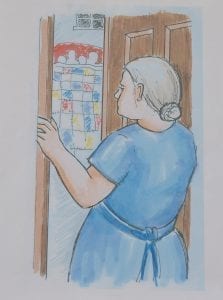What Will You Do. . .when they tell you?
Only by observing on a constant basis the differences of genetics and environment on your own children, can you begin to see how unequal we are born. This has been an ongoing study for me because of my own differences and peculiarities as compared to my 7 siblings and also these same differences and similarities in our 3 sons.
The topic has been repeated with added nuances and differentiation as the years progress. Strangely there have been fewer inconsistencies simply because time kaleidoscopes into simultaneous events with my scribing.
When reading Doris Lessing’s Shikasta series the psychiatrist raises the significance in quality of thought. Just two percent difference in the quality of thought puts both people, the talker and the listener in different countries and maybe worlds.
2 % is enough truly for different worlds. All we have to do is look about our world. Within families at the table, one notes the differences in emotional maturity. When listening to the arguments, especially when tempers rise, one wonders who are the children and who the adults.
It is staggering to the senses when one notes with alarm the maturity assumed by the sons and daughters with the preponderance of classes in debating. The elders, whether in Congress or in business depend greatly on sophistication that comes with experience. And assume those will carry their argument.
My generation still assumes that all are created equally. I cannot come to any word describing even one characteristic having no exception. Coming to mind are the two girl playmates on the train to Chicago. Both beautiful, different skin colors. . . overheard talking about birth marks, with one having a large visible mark.
Some of us have them on the outside, said one and some of us on the inside. They both agreed. And some still harbor the notion that all are a clean slate at birth to be written on by our compulsory education. Even though educational systems differ throughout the country but this fact escapes their thinking.
We must stress the abilities of unique differences. And how these enrich our lives. When we look into the eyes of children we should see angels walking into our hearts. If you are fortunate they will call you Baba knowing you are the safe one. You are the haven they require if the world is to progress and they are to contribute.
When you see how much you invest in each child to instill needful habits you realize the great differences. And muttering in exasperation where did you come from? What would you do or think if you truly knew from where?
And what will you do when they tell you?
artwork by
Claudia Hallissey

2 responses to “What Will You Do?. . . .”
“You are the haven they require if the world is to progress and they are to contribute”. this line more than anything I’ve read or felt could make me think twice about my decision not to have children. Why have I never thought of children in this way before? Maybe it speaks to me because the idea makes children seem to me like any creation I would want to put out into the world. Or maybe it’s the clarity of the roll a parent is responsible to play in a child’s life.
Maria, to me it is a good sign when a question arises when something new strikes home.
When you ask a why to a thought it should be pursued. We are often surprised at the
revelation to sincere questions. It is real work to grapple with unknowns,
but rewards are priceless. Thank you for your deep thought.